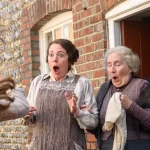COLCOA 2018: The Prayer, by David Bax
The COLCOA (City of Lights, City of Angels) French Film Festival is a week of French film premieres in Hollywood.
Time just slides by in Cédric Kahn’s The Prayer. Weeks, even months, will pass by in between shots, snow appearing and disappearing from the French countryside. This is perhaps meant to reflect the experience of an addict, so consumed by their fixation and dependence that time loses meaning. Except the movie only joins its characters, addicts though they may be, after they’ve achieved a stable sobriety. The questions raised here, about the extent to which their relationship to the world is changed by kicking heroin, alcohol, etc., is only one of the many Kahn inspects in this thoughtful, charitable film.
Anthony Bajon, an actor in his mid-twenties who could pass for fifteen, plays Thomas, a heroin addict who is sent to Catholic-run rehabilitation farm in the mountains. He is initially resistant, sometimes violently so, to the newly imposed rules and restrictions on his life. With his baby-faced rage, early stretches of The Prayer play like a rehab Starred Up. But the other young men (they’re all men) wait him out with understanding and kindness. Kahn encourages us to do the same and eventually we see a new Thomas reflected in his relationships to his fellow residents, to God and to a young woman who lives in the nearby town the men visit for supplies. But not necessarily in that order.
Eager though Kahn may be to probe Thomas’ psyche, his approach is one of remarkable patience. Thomas’ path to betterment—or, at least, change; The Prayer is noncommittal when it comes to moral appraisals—is informed by those around him, other young men, many of whom have been at the farm longer. So, naturally, Kahn gives plenty of time over to them and their histories. One of the movie’s best scenes is simply a procession of addicts standing before the group and giving testimonies. It’s reminiscent of the wedding toasts in Rachel Getting Married.
There’s such an endearing dorkiness to how earnest these men all are that it’s occasionally easy to forget that they were junkies (the movie’s term, not mine). It’s also easy to overlook that their common goals of sobriety and belonging don’t necessarily mean that they share values with each other or with the Catholics who run the program. The latter difference is made stark by a sudden, shocking encounter between Thomas and a nun following his own testimony.
There’s no one prayer to which the title refers. In true Catholic fashion, the prayers themselves sometimes don’t seem as important as the memorization and repetition of them. They’re like mantras. The monastic devotion that grows in Thomas is evident; Bajon makes it palpable. But the question remains: Is it genuine or is the all-consuming, isolated nature of the farm equivalent to a cult brainwashing scenario? Or, more simply, is Thomas replacing one kind of dependency with another? The Prayer is all the more engrossing for leaving the answering of these questions up to us.





























